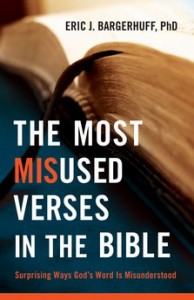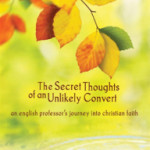The Most Misused Verses in the Bible: Surprising Ways God’s Word Is Misunderstood
by Eric J Bargerhuff

Genre: Bible study
Size: 179 pages, 19 chapters, you could read the whole thing in a day. I did a chapter a day and it helped me to consider each “misused verse” better.
What’s the big idea: An invitation to come face-to-face with 17 of the most misused verses in the Bible: verses that have often lost their context today and taken on new meanings outside the stories and teachings of Scripture. The biggest lesson is to study each verse in context of the chapter, place in history and other variables to rightly understand its meaning (also called “exegesis”).
Easy to read? Yes. Each chapter deals with a frequently misunderstood verse, and takes about 5-10 minutes max. Eric uses lots of good illustrations to draw the reader in. Sentences are clear, there’s not a lot of big words used so you won’t need a theology degree to understand what he’s saying.
What I appreciated: You leave each chapter having a better understanding of verses like “Do not judge, or you too will be judged”, “Where two or three are gathered together in my name, there I am in the midst of them” and others.
For example with the “hope and a future” verse (Jeremiah 29:11—13), after good context work, Eric sums up:
Jeremiah 29:11—13 contains some great promises, but if I use it to demand the American Dream from God, then perhaps I should also be willing to literally endure seventy years of captivity first (if that’s what God should choose). I think it’s better to use it to inspire us to look for the spiritual life that is truly life now, while trusting in the future hope of the life that is yet to come.
Eric also has a gracious tone as he writes. Even if you don’t agree with his conclusions on the correct reading of a passage, you won’t find yourself hurt by how he’s explained them to you.
Who I’d recommend it to: I think this book would be helpful for new Christians in particular to see examples of how to (and how not to) interpret God’s Word. I remember as a new Christian that most of the teaching I received about Christian life came in the form of little bible verses like these, and I would have appreciated a resource like this back then. Yet even for mature Christians it’s a helpful book too, as the temptation to take shortcuts in understanding the Bible’s meaning still comes up.
Notable quotes:
“At the heart of all human sinfulness is lawlessness and the prideful appeal to be our own god. To determine our own destiny. To have our own way. To throw off restrictions and doubt the integrity of God’s goodness. To doubt the trustworthiness of his Word. And all we need to do in order to start down that path is to give Scripture a new context, twist its meaning, or interpret it in a way that appeals to the supremacy and glory of man.”
“We must also resist the temptation to make a passage “work” how we want it to work or “make it say” what we want it to say. Many have fallen prey to this temptation and as such have read into Scripture what they want to see.”
“The proper question should not be “What does this passage mean to me?” but rather “What were the author’s original intentions and how did the audience who first received it understand those intentions in the original context?” And then, only after discovering this is it appropriate to ask, “How then does the timeless biblical principle contained in this passage apply to me?””
Verdict: (on a scale of Must read, Good to read, OK to read, don’t read) Good to read
Click here to grab a copy.
——————————
Note: Thanks to Robyn Drake for her book discovery template, which I’ve adapted here.
Further reading:
- Trevin Wax also reviewed the book here.
- Chris Blumhofer dives further into Jeremiah 29:11-13.
——————————



